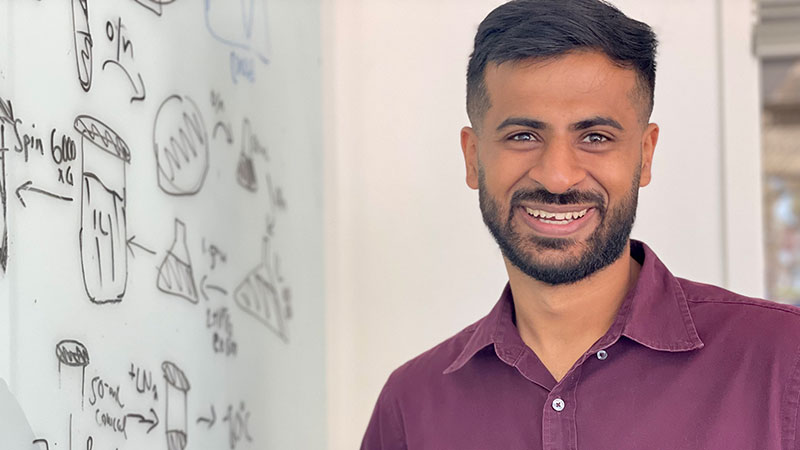A chemical engineer by trade, postdoctoral researcher Ravi Chawla investigates the molecular tricks employed by bacteria to evade antibiotic treatment. Under the supervision of Lisa Racki and Ashok Deniz, Chawla was recently awarded an American Heart Association Postdoctoral Fellowship to understand and counteract dangerous bacterial infections of the heart.
Read on to learn more about Chawla’s unorthodox path to studying microbiology, as well as how he balances out serious scientific problems with a healthy dose of comedy.

Tell us about your initial passion for science growing up.
Well, it really happened via engineering. I grew up in a very small town in India with a family that had its roots in farming. I think my father just wanted me to start working and earning money, but I saw my friends moving to the city to pursue higher education and that made me want to do the same. The two major directions were doctor or engineer, and I knew I was very squeamish about doing anything with biology. Then I happened to talk with a neighbor who was a chemical engineer. I didn’t have a clue what chemical engineering was at the time, but he told me that it involved all the processes in physics and chemistry that I had enjoyed studying. Since there wasn’t a support system of career counselors, I realized my path by asking other people in the field.
Squeamishness aside, how did you start applying your engineering expertise to biological problems?
During my PhD I started studying the bacterial flagella motor. This is like a propeller on bacterial cells that allows them to move. It’s one of the fastest rotary engines you can conceive of with hundreds of revolutions every second. It turns out that these motors are very dynamic structures that can also sense mechanical force. I was investigating this mechanical-sensing ability of bacteria and how it allows them to swim around and know they’re on a surface before they trigger pathways for pathogenesis or colonization.
What kinds of bacteria do you currently study and how are they relevant to human health?
We study Pseudomonas species, which are often found in soil and water. They tend to be dangerous when you are immunocompromised in some way. They’re known to cause infections in patients with cystic fibrosis and severe burns, but in some cases, they can also colonize the valves of the heart. I was just awarded a fellowship from the American Heart Association to study the molecular processes important in Pseudomonas aeruginosa infections. I also learned that Pseudomonas account for a large proportion of all hospital-acquired infections, yet I had never appreciated the full significance of this until last year when I had a medical issue of my own. Seeing people there in the hospital with their defenses down made me realize that this research is the way that I can make a difference to the lives of patients.
Could this work solve some of the issues around antibiotic tolerance?
That’s a major long-term goal of the lab and a huge unmet medical need. Some of these microbes also have a high resistance to heat or to strong cleaning chemicals like hydrogen peroxide or bleach, so when medical facilities try to sterilize and reuse equipment, the bacteria can survive and quickly spread from one patient to the next. Other microbes can more effectively deal with the lack of nutrients that they might encounter in the interior of bacterial communities, called biofilms, which are associated with chronic infections. We are currently probing different stress pathways of bacteria that allow for their survival, such as their responses to starvation or chemical stressors. If we understand these pathways, we can identify new molecules that interfere with the process and ultimately prevent infection. This would be a whole new class of drugs that work in different ways to traditional antibiotics.
When you’re not investigating bacteria, what are some of your other interests?
Being from Northern India, I’m a big fan of Punjabi music. Whenever I hear it, my body tends to move uncontrollably and I must start dancing. I also love comedy. In fact, I’ve been known to slip into character and do impersonations of different people, such as Borat. This is particularly funny since I used to be a very sensitive kid and I think I took myself too seriously. Now I’ve learned to let go and I find that comedic relief provides a very good antidote to a serious world.